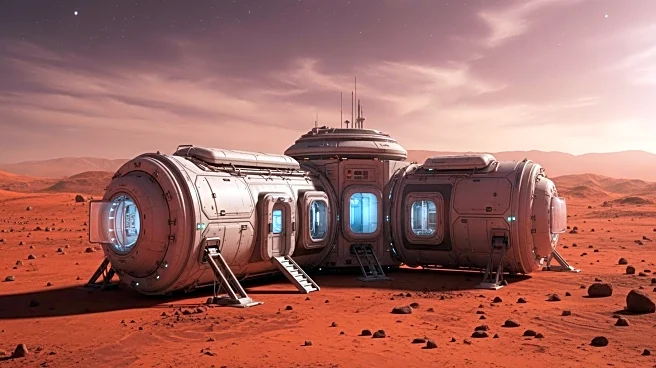What's Happening?
NASA's Johnson Space Center is conducting a series of Mars simulation missions known as Chapea, designed to evaluate human health and performance in a Mars-like environment. These missions involve placing
crews in isolation for 378 days in a habitat made of lavacrete, a material mimicking Martian soil. The habitat includes essential living spaces and a crop growth area where crews have successfully grown small crops like tomatoes and leafy greens. The simulation aims to replicate the challenges of living on Mars, including limited communication, resource constraints, and psychological pressures. Participants engage in tasks such as spacewalks and experiments to simulate real Mars missions.
Why It's Important?
The Chapea missions are crucial for understanding the feasibility of long-term human habitation on Mars. They provide insights into the psychological and physical challenges astronauts may face, such as isolation, confinement, and limited resources. These simulations help NASA and other space agencies prepare for future manned missions to Mars by testing technologies and strategies for sustaining human life in a hostile environment. The findings could influence the design of habitats, life support systems, and mission protocols, ultimately contributing to the success of interplanetary exploration and the potential for human settlement on Mars.
What's Next?
As the Chapea missions continue, NASA will analyze data from these simulations to refine strategies for future Mars missions. The insights gained will inform the development of technologies and protocols necessary for sustaining human life on Mars. Future steps may include more advanced simulations, international collaborations, and the integration of new technologies to address the challenges identified. The ultimate goal is to pave the way for a successful manned mission to Mars, potentially within the next few decades, as space agencies and private companies like SpaceX work towards making interplanetary travel a reality.
Beyond the Headlines
The ethical and logistical implications of human settlement on Mars are significant. The simulations highlight the psychological toll of isolation and the need for robust support systems to maintain mental health. Additionally, the environmental impact of establishing a human presence on Mars raises questions about planetary protection and the preservation of potential Martian ecosystems. These considerations will play a critical role in shaping policies and guidelines for future missions, ensuring that exploration efforts are conducted responsibly and sustainably.









